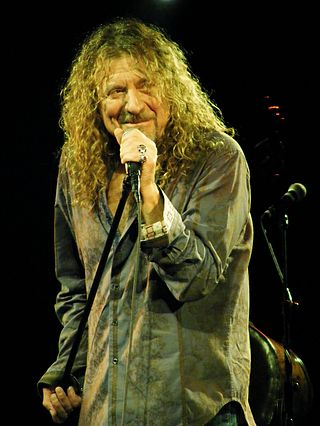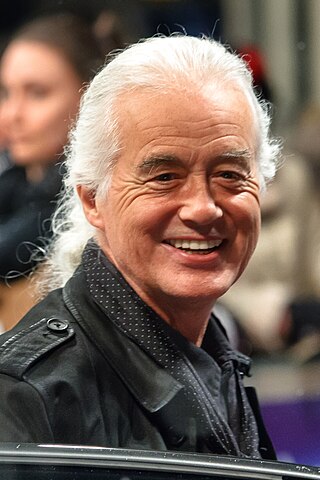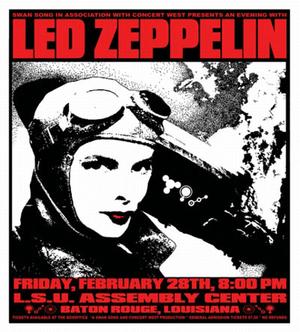
Led Zeppelin were an English rock band formed in London in 1968. The group comprised vocalist Robert Plant, guitarist Jimmy Page, bassist and keyboardist John Paul Jones, and drummer John Bonham. With a heavy, guitar-driven sound, they are cited as one of the progenitors of hard rock and heavy metal, although their style drew from a variety of influences, including blues and folk music. Led Zeppelin have been credited as significantly impacting the nature of the music industry, particularly in the development of album-oriented rock (AOR) and stadium rock.

The Song Remains the Same is a 1976 concert film featuring the English rock band Led Zeppelin. The filming took place during the summer of 1973, during three nights of concerts at Madison Square Garden in New York City, with additional footage shot at Shepperton Studios. The film premiered three years later on 20 October 1976 at Cinema I in New York, on 21 October 1976 at Fox Wilshire in Beverly Hills, and at Warner West End Cinema in London two weeks later. It was accompanied by a soundtrack album of the same name. The DVD of the film was released on 31 December 1999.

John Baldwin, better known by his stage name John Paul Jones, is an English musician, composer, and record producer who was the bassist and keyboardist for the rock band Led Zeppelin. Prior to forming the band with Jimmy Page in 1968, he was a session musician and arranger. After the death of drummer John Bonham in 1980, Led Zeppelin disbanded, and Jones developed a solo career. He has collaborated with musicians across a variety of genres, including the supergroup Them Crooked Vultures with Dave Grohl and Josh Homme, and Alain Johannes. He was inducted into the Rock and Roll Hall of Fame in 1995 as a member of Led Zeppelin.

Robert Anthony Plant is an English singer and songwriter. He was the lead singer and lyricist of the rock band Led Zeppelin from its founding in 1968 until their breakup in 1980; since then he has had a successful solo career, sometimes collaborating with other artists such as Alison Krauss. Regarded by many as one of the greatest singers in rock music, he is known for his flamboyant persona and raw stage performances.

James Patrick Page is an English musician and producer who achieved international success as the guitarist and founder of the rock band Led Zeppelin. Prolific in creating guitar riffs, Page’s style involves various alternative guitar tunings and melodic solos, coupled with aggressive, distorted guitar tones. It is also characterized by his folk and eastern-influenced acoustic work. He is notable for occasionally playing his guitar with a cello bow to create a droning sound texture to the music.

John Henry Bonham was an English musician who was the drummer of the rock band Led Zeppelin. Noted for his speed, power, fast single-footed kick drumming, distinctive sound, and feel for groove, he is regarded as one of the greatest and most influential drummers in music history.

Peter Grant was an English music manager, best known as the manager of Led Zeppelin from their creation in 1968 to their breakup in 1980. With his intimidating size and weight, confrontational manner, knowledge and experience, Grant was able to procure strong and unprecedented deals for Led Zeppelin, and is widely credited with improving pay and conditions for all musicians in dealings with concert promoters. Grant has been described as "one of the shrewdest and most ruthless managers in rock history".
Richard Cole was an English music manager, who was involved in the rock music business from the mid-1960s to 2003. He is most known for having been the tour manager of English rock band Led Zeppelin from 1968 to 1980.

Stephen Maynard Clark was an English musician. He was a guitarist and songwriter for the hard rock band Def Leppard until his death in 1991. In 2007, Clark was ranked No. 11 on Classic Rock Magazine's "100 Wildest Guitar Heroes". In 2019, Clark was posthumously inducted into the Rock and Roll Hall of Fame as a member of Def Leppard.

Tour Over Europe 1980 was the last concert tour by the English rock band Led Zeppelin. The tour ran from 17 June to 7 July 1980. Nine of the tour's shows were performed in cities throughout West Germany, as well as one show each in Brussels, Rotterdam, Vienna, Zürich, and West Berlin.

Led Zeppelin's 1977 North American Tour was the eleventh and final concert tour of North America by the English rock band. The tour was divided into three legs, with performances commencing on 1 April and concluding on 24 July 1977. The tour was originally intended to finish on 13 August, but was cut short following the death of Robert Plant's son.

Earls Court 1975 were five concerts performed by the English rock band Led Zeppelin at Earls Court Arena in London in May 1975.

Led Zeppelin's 1975 North American Tour was the tenth concert tour of North America by the English rock band. The tour was divided into two legs, with performances commencing on 18 January and concluding on 27 March 1975. It was preceded with two European warm-up shows, performed at Rotterdam and Brussels respectively.

Led Zeppelin's 1973 North American Tour was the ninth concert tour of North America by the English rock band. The tour was divided into two legs, with performances commencing on 4 May and concluding on 29 July 1973. Rehearsals took place at Old Street Film Studios in London.

Led Zeppelin's 1972 North American Tour was the eighth concert tour of North America by the English rock band. The tour was divided into two legs, with performances commencing on 27 May and concluding on 28 June 1972. It included two warm-up shows in Europe.

Led Zeppelin's 1968/1969 tour of North America was the first concert tour of the United States and Canada by the English rock band. The tour commenced on 26 December 1968 and concluded on 16 February 1969. It was important for the band, as their popularity grew substantially because of the concerts and helped them reach significant commercial success in the US, which translated to sales elsewhere.

Led Zeppelin's 1968 tour of the United Kingdom was the first concert tour of the United Kingdom by the English rock band. It commenced on 4 October and concluded on 20 December 1968.

The Knebworth Festival 1979 consisted of two concerts performed by the English rock band Led Zeppelin and other artists at Knebworth House, Hertfordshire, England, in August 1979.

Hammer of the Gods is a book written by music journalist Stephen Davis, published in 1985. It is an unauthorized biography of the English rock band Led Zeppelin. After its release it became a New York Times bestseller paperback, and is hyped by its publisher as being the best-known Led Zeppelin biography. It has been reprinted three times since its first publication and has been released under the alternative title Hammer of the Gods: The Led Zeppelin Saga. The title is derived from a line in "Immigrant Song", a track from the band's third album.

Led Zeppelin – The 1980s, Part One was a planned autumn 1980 concert tour of North America by the rock band Led Zeppelin. It was scheduled to take place from 17 October through 15 November of that year and cover much of the East Coast and Midwest. The band cancelled the tour when drummer John Bonham died on 25 September, one day after the group's initial rehearsal for the tour.



















